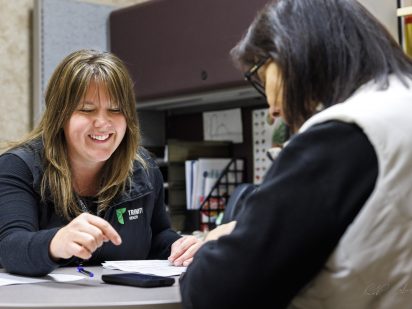Over the past 50 years, medical advances have led to a more sophisticated understanding of the causes of Type 2 diabetes and to an abundance of new tools for managing it. But better treatments alone are not the total answer to successful diabetes management.
According the Centers for Disease Control and Prevention, 37 million people of all ages in the United States have diabetes, or 11.3% of the population. In the last 20 years, the number of adults diagnosed with diabetes has more than doubled as the American population has aged and become more overweight or obese. Among those 65 years or older, the percentage of adults with diabetes increased to 29.2%.
Each patient with Type 2 diabetes faces a cascade of risks, including painful nerve damage, vision loss, kidney disease and heart disease, as well as foot and toe amputations.
Trinity Health’s Center for Diabetes and Nutrition Education, located in Town & Country Center, has been a partner in diabetes management for over a decade.
Accredited by the Association of Diabetes Care & Education Specialists, the Diabetes Center consists of a collaborative team of diabetes care and education specialists and dietitians who provide compassionate care, expert guidance and ongoing support to help patients meet their goals.
“Our job is to be a support system for patients for the long term. Through team-based care, we are advocates for good health throughout work and life challenges,” said Andrea Anhorn, RN, BSN, CDCES. “During one-on-one meetings, we sit with patients to review what their daily diabetes care looks like, discuss barriers and struggles, and identify ways in which we can help, based on their individualized needs.”
In 2020, the Association of Diabetes Care & Education Specialists joined with six other healthcare organizations to co-publish a consensus report that outlined evidence for the increased use of diabetes self-management education and support (DSMES) in adults with Type 2 diabetes. The report recommended provider referrals at four critical times during diabetes disease management: at diagnosis; annually, or when not meeting targets; when complicating factors develop; when transitions and life and care occur.
The purpose of DSMES is to give people with diabetes the knowledge, skills and confidence to accept responsibility for their self-management. This includes collaborating with their healthcare team, making informed decisions, solving problems, developing personal goals and action plans, and coping with emotions and life stresses. However, despite considerable evidence that services are cost-effective and have a positive impact on diabetes-related outcomes, utilization of DSMES services is suboptimal. In the United States, less than 5% of Medicare beneficiaries with diabetes and 6.8% of privately insured people with diagnosed diabetes have used DSMES services.
Wayne Krefting has been a regular at the Diabetes Center for approximately three of his 30+ years of diabetes management. Referred by his provider, he sees Andrea Anhorn “about every four to six weeks” to help monitor medications and insulin levels. Krefting, 86, self-administers daily insulin shots to keep his blood sugar in check.
“One of the greatest things that’s helped me is the Dexcom G6 sensor. It allows me to be able to see my reading all the time. It won’t let me cheat. When I had to prick my fingers, I only did it when I knew my blood sugar reading would be low,” Krefting admitted.
The Dexcom G6 Continuous Glucose Monitoring System (CGM) provides Krefting glucose readings every five minutes by sending data wirelessly to his iPhone. He is assisted with training and support by his diabetes care education specialist.
Krefting said that also consulting with dietitian Michelle Fundingsland, RDN, LRD, has influenced his decisions about food choices. He said he has learned how to make healthier eating choices and to control portions sizes on favorite foods, such as pasta.
“Our team assessments also look at many different areas where there may be non-scale victories,” Fundingsland said. She says that lifestyle changes such as getting enough sleep, quitting smoking, drinking more water or counting steps all contribute to less stress and a better quality of life.
Diabetes care and education specialists collaborate with a person who has diabetes to create a plan of care that is personalized to an individual’s lifestyle,culture, beliefs and environment. Sessions cover everything from how to use devices to interpret data to identify patterns and areas of concern. Together they work to find solutions to address the most pressing challenges.
Holly Burckhard, 23, has Type I diabetes, a diagnosis that was “devastating” when she found out at age 9. At that time, Anhorn was a nurse in the Pediatric Unit who fostered an interest in diabetes care and technology in children. The relationship between Burckhard and Anhorn began 14 years ago in the hospital and continues today at the Diabetes Center.
“Over the years, I’ve learned how to monitor my blood sugar and maintain pretty good control. Andrea’s taught me how to count carbohydrates and provided a refresher on all the new food that I should be eating,” said Burckhard.
Anhorn said the goal of the diabetes team is to ensure coordination between nutritional therapy, medication management, DSMES and overall health management. “We are available to educate about new medications, new technology, assist providers and facilitate lifestyle choices,” she said. “Our goal is to support patients over their lifetime.”
In addition to diabetes management, the Center for Diabetes and Nutrition Education also offers outpatient medical nutrition therapy for individuals who have other needs such as cardiovascular, food allergies, kidney disease, cancer, weight management, childhood and adult nutrition and more.
Other nutrition services offered include diabetes prevention program, community presentations, grocery shopping tours and cooking classes.
Talk to your provider to learn more about Trinity Health’s Center for Diabetes and Nutrition Education, call 701-857-5268 or visit: www.trinityhealth.org/nutrition.

